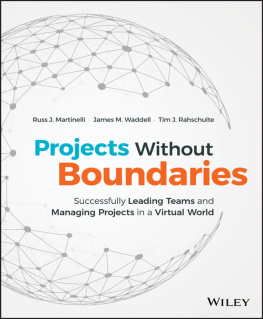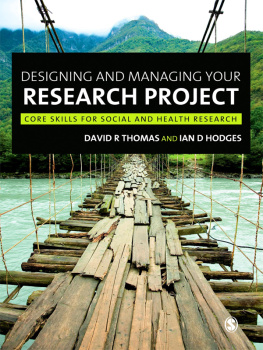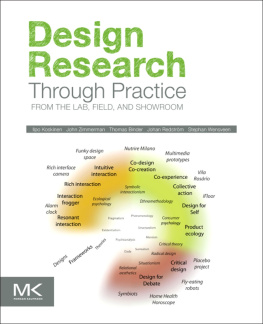Practical Academic
Managing Research Groups and Projects
Jennifer Rowland
Contents
Practical Academic
Managing
Research Groups and
Projects
Effective management practices
for academic researchers
Jennifer Rowland
P ractical Academic . Research Group and Project Management
Copyright 2017 by Jennifer Rowland
A ll rights reserved .
No part of this book may be used or reproduced in any manner whatsoever without written permission except in the case of brief quotations embodied in critical articles or reviews.
This publication is designed to provide information to promote thought on research management practices. It is sold with the understanding that the writer and publisher are not engaged in rendering legal, business, accounting, or other professional advice. If legal advice or other expert assistance is required, the services of a competent professional should be sought. This book presents reflection and case studies related to activities involved in managing research groups and projects. It has intentionally been written in a way to omit any specific names, characters, places, or incidents. The intention is to reinforce management concepts by considering their application, or lack thereof, in a theoretical professional setting. Any mistakes in this reflective work are made by the author and not the experts who generously provided their time to provide information.
F or information contact Jennifer Rowland
http://www.practicalacademic.com
Book cover design by Bek Pickard from Zebedee Design.
First Edition: January 2017
10 9 8 7 6 5 4 3 2 1
Foreword
T hank you so much for buying this book!
I developed this content over a long period of time spent reflecting on my experiences in academic research, as well as those of my peers, spanning multiple countries and institutions. Since stepping into a career focused on training postgraduate researchers, I have observed that many of the issues that junior researchers confront, could be better addressed at the supervisory level. In particular, if group leaders were to run their research more systematically, and provide a solid framework within which their team could operate, so many of the issues that I confront with trainee researchers down the line could be avoided.
The purpose of this guide is to give you a hands-on outline of what is it like managing an academic experimental research group, and some tips on everyday issues that you can encounter in your work. This book is mostly a practical guide, focused on helping you to identify managerial approaches that you can routinely implement in your role as a group leader.
The sixteen chapters of this book are divided into general group leadership (chapters 1-8) and project management (chapters 9-16). I have included case studies throughout, to illustrate concepts and provide insight into situations that arise in the research environment. Exercises and reflection points are included to the end of each chapter to relate the introduced concepts to your own experiences. Downloadable materials are listed at the end of each chapter: these can accessed from my companion Practical Academic website ( www.practicalacademic.com/resources ). These materials collectively form a Group Leaders Toolkit, which can help you to simply employ the practices outlined here in your own group.
I sincerely hope that the materials presented here can help you to reflect and improve on your own academic research leadership practices. Many of you will naturally employ many of these techniques already, and thus may find this common sense, but the intention here is to help those that do not already consider these approaches. I welcome you to this first edition, and look forward to reading your feedback, as much like a quality Group Leader, I am always looking for consistent and ongoing improvement.
With warm regards,
Jennifer Rowland
Acknowledgments
T his book would not be a reality without the ongoing encouragement and support of Guy and Michaela Windsor, to whom this book is dedicated. So many others have supported its creation along the way. For sharing their critical eye, I am immensely grateful to Kaisa Silander, Josien de Bie, Sarah McNicol, and Fiona MacDonald. Huge thanks to Becca Judd who has provided outstanding proofreading of the manuscript, and Bek Pickard who designed the cover. John Rowland and Tracey Mackney provided superb general feedback, thankyou. Thank you to my friends who have provided feedback on the aesthetics: Laura Quinton, Sara Happanen, Sam Clayton, Terri Campbell, Yvonne Barrett, Melanie Stanton, Gerry Stewart, Alicia Coyle, and Sally Purcell. My beautiful children Rafael and Maya have been incredibly understanding and supportive during the creation of this book, for which I am immensely grateful. To my friends and family that have helped me during the last few years, through the highs and lows, thank you so much for your incredible support, it means the world to me.
D isclaimer
The material and opinions presented in this book are my own and not representative of any other party or organization.
Section 1: Managing A Research Group
I n this section we focus on overall group management, which represents the basis for establishing a functional research platform. We consider the development of a team and operational approaches that support a solid and innovative research environment. We also review common issues that surround the management of research groups. This discussion is presented in the following chapter structure:
- Chapter 1 introduces the research business and how you fit in it as a group leader.
- Chapter 2 describes several different group management structures.
- Chapter 3 discusses issues relating to securing and retaining exceptional staff and students.
- Chapter 4 reflects on practical organizational issues relevant to group management.
- Chapter 5 discusses networking, both inside and outside of the institution.
- Chapter 6 describes scheduling approaches and concerns that impact group management.
- Chapter 7 focuses on common issues regarding personal and professional dynamics.
- Chapter 8 introduces some approaches to help you juggle teaching commitments.
This section is delivered from the point of view of a group leader who is working in an academic research institution or university. The principal type of research discussed throughout this book is assumed to be experimentally-focused, predominantly quantitative, and pursuing hypothesis-testing investigations. Nonetheless, those pursuing alternative investigation styles may still benefit from the concepts discussed here.
1
Running a Research Business
R esearch is a business , and considering it this way is advisable when you are part of a research group, regardless of your position within the framework. Nonetheless, as a researcher you are unlikely to be focused on revenue accumulation or profit margins, but rather will be aiming for particular project goals that might include journal articles, theses, or the development of something useful for humanity.









